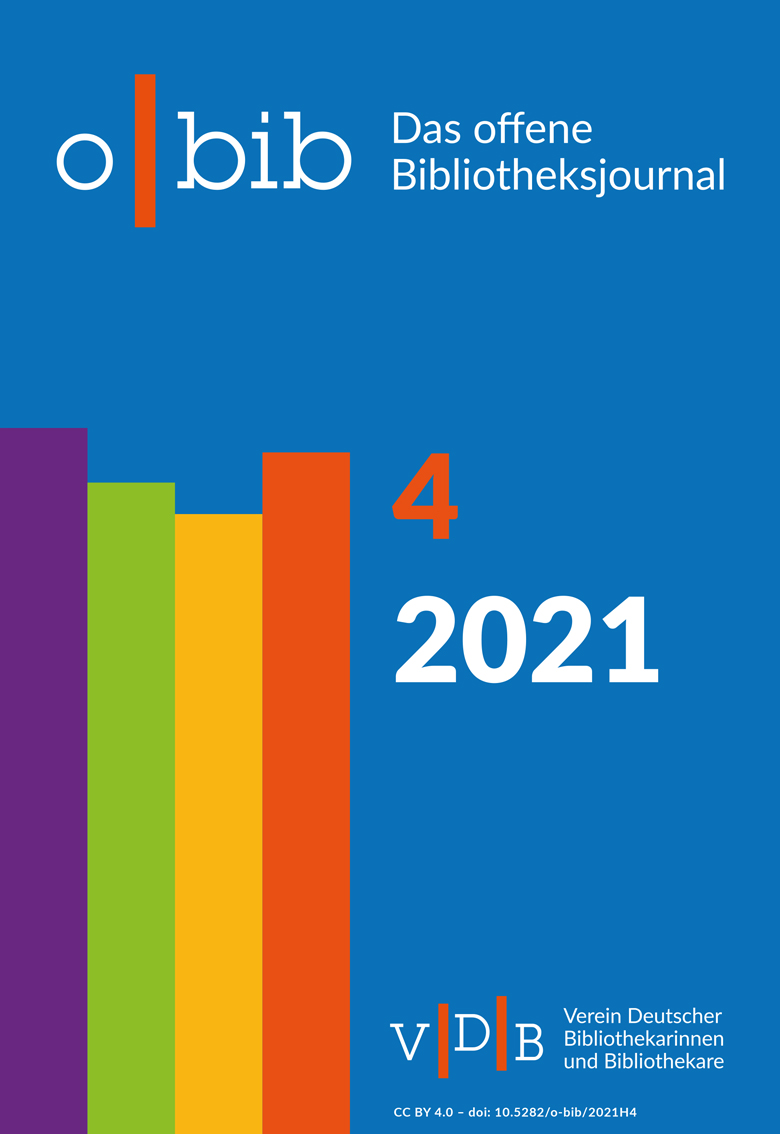Dezentrale Identifikatoren (DIDs)
Die nächste PID-Evolution: selbstsouverän, datenschutzfreundlich, dezentral
DOI:
https://doi.org/10.5282/o-bib/5755Schlagwörter:
Persistent Identifier, Dezentralisierung, Datenschutz, Manipulationssicherheit, Forschungsdatenmanagement, Self-Sovereign IdentityAbstract
Dieser Beitrag behandelt den zuletzt vom W3C hervorgebrachten Standard für dezentrale Identifikatoren (Decentralized Identifiers, kurz: DIDs) in Bezug auf den Bereich des Forschungsdatenmanagements. Es wird dargelegt, dass die aktuell im wissenschaftlichen Publikationswesen häufig verwendeten persistenten Identifikatorensysteme (Persistent Identifiers, PIDs) wie Handle, DOI, ORCID und ROR aufgrund ihrer Zentralisierung fundamentale Probleme hinsichtlich der Datensicherheit, dem Datenschutz und bei der Sicherstellung der Datenintegrität aufweisen. Dem werden als mögliche Lösung das System der DIDs gegenübergestellt: eine neuartige Form von weltweit ein- deutigen Identifikatoren, die durch jedes Individuum oder jede Organisation selbst generiert und auf jeder als vertrauenswürdig erachteten Plattform betrieben werden können. Blockchains oder andere Distributed-Legder-Technologien können dabei als vertrauenswürdige Datenregister fungieren, aber auch direkte Peer-to-Peer-Verbindungen, auf bestehende Internetprotokolle aufsetzende Methoden oder statische DIDs sind möglich. Neben dem Schema wird die technische Spezifikation im Sinne von Datenmodell und die Anwendung von DIDs erläutert sowie im Vergleich die Unterschiede zu zentralisierten PID-Systemen herausgestellt. Zuletzt wird der Zusammenhang mit dem zugrundeliegenden neuen Paradigma einer dezentralen Identität, der Self-Sovereign Identity, hergestellt. SSI repräsentiert ein gesamtes Ökosystem, in dem Entitäten ein kryptografisch gesichertes Vertrauensnetzwerk auf der Basis von DIDs und digitalen Identitätsnachweisen bilden, um dezentral manipulationsgesichert und datenschutzgerecht identitätsbezogene Daten auszutauschen. Zum Schluss der Abhandlung stellt der Autor fünf zuvor herausgearbeitete Anforderungen in Bezug auf eine zeitgemäße Umsetzung von persistenten Identifikatoren vor.
Literaturhinweise
Berners-Lee, T.; Fielding, R.; Masinter, L.: Uniform Resource Identifier (URI): Generic Syntax, Request for Comments: 3986, Internet Society, 2005. Online: https://www.rfc-editor.org/rfc/rfc3986.txt, Stand: 15.07.2021.
Bundesamt für Sicherheit in der Informationstechnik: Die Lage der IT-Sicherheit in Deutschland 2020, Bonn 2020. Online: https://www.bsi.bund.de/SharedDocs/Downloads/DE/BSI/Publikationen/Lageberichte/Lagebericht2020.pdf?__blob=publicationFile&v=1, Stand: 15.07.2021.
Corporation for National Research Initiatives: Projects, CNRI System & Technology Demonstration Projects, 2020, http://www.cnri.reston.va.us/projects.html, Stand: 15.07.2021.
Corporation for National Research Initiatives: Prefix Registration, handle.net, 2018, https://www.handle.net/prefix.html, Stand: 15.07.2021.
Corporation for National Research Initiatives: Privacy Policy, handle.net, 2015, https://handle.net/privacy_policy_hnet.html, Stand: 15.07.2021.
Daigle, L.; Gulik, D.W. van; Iannella, R. u. a.: Uniform Resource Names (URN) Namespace Definition Mechanisms, Request for Comments: 3406, Internet Society, 2002. Online: https://www.rfc-editor.org/rfc/rfc3406.txt, Stand: 15.07.2021.
DataCite: How do I get DOIs?, DataCite Support, 2020, https://support.datacite.org/docs/how-do-i-get-dois, Stand: 15.07.2021.
DataCite Metadata Working Group: DataCite Metadata Schema Documentation for the Publication and Citation of Research Data and Other Research Outputs: Version 4.4, 2021. Online: https://doi.org/10.14454/3w3z-sa82.
Deutsche Nationalbibliothek: URN-Service, dnb.de, 2021, https://www.dnb.de/DE/Professionell/Services/URN-Service/urn-service_node.html, Stand: 15.07.2021.
Deutsche Nationalbibliothek: Normdaten in der Wissenschaft – Vernetzung von GND und ORCID, dnb.de, 2020, https://www.dnb.de/DE/Professionell/ProjekteKooperationen/projekteKoop_node.html#sprg446188, Stand: 15.07.2021.
Dierkes, Jens: Planung, Beschreibung und Dokumentation von Forschungsdaten, in: Putnings, Markus; Neuroth, Heike; Neumann, Janna (Hg.): Praxishandbuch Forschungsdatenmanagement, Berlin/Boston 2021, S. 303–325. Online: https://doi.org/10.1515/9783110657807-018.
Digital Science: GRID - Global Research Identifier Database, grid.ac, 2021, https://grid.ac, Stand: 15.07.2021.
DomainTools: Whois Record for ror.org, Whois Lookup, o. D., https://whois.domaintools.com/ror.org, Stand: 15.07.2021.
DONA Foundation: About DONA, dona.net, 2020, https://www.dona.net/aboutus, Stand: 15.07.2021.
Ehrlich, Tobias; Richter, Daniel; Meisel, Michael u. a.: Self-Sovereign Identity als Grundlage für universell einsetzbare digitale Identitäten, in: HMD Praxis der Wirtschaftsinformatik 58 (2), 2021, S. 247–270. Online: https://doi.org/10.1365/s40702-021-00711-5.
FORCE11: The FAIR Data Principles, force11.org, 2016, https://www.force11.org/group/fairgroup/fairprinciples, Stand: 15.07.2021.
International DOI Foundation: 7 International DOI Foundation, DOI Handbook, 2018, https://www.doi.org/doi_handbook/7_IDF.html, Stand: 15.07.2021.
International DOI Foundation: 1 Introduction, DOI Handbook, 2015, https://www.doi.org/doi_handbook/1_Introduction.html, Stand: 15.07.2021.
International DOI Foundation: Privacy Policy, DOI.ORG, 2012, https://www.doi.org/w3c/privacy.html, Stand: 15.07.2021.
Moats, R.: URN Syntax, Request for Comments: 2141, Internet Society, 1997. Online: https://www.rfc-editor.org/rfc/rfc2141.txt, Stand: 15.07.2021.
ORCID: About, info.orcid.org, 2021, https://info.orcid.org/what-is-orcid/, Stand: 15.07.2021.
ORCID: Privacy Policy, info.orcid.org, 2021, https://info.orcid.org/privacy-policy/, Stand: 15.07.2021.
ORCID: Record Schema, info.orcid.org, 2021, https://info.orcid.org/documentation/integration-guide/orcid-record/, Stand: 15.07.2021.
ORCID: Public Data File Use Policy, info.orcid.org, 2021, https://info.orcid.org/public-data-file-use-policy/, Stand: 15.07.2021.
ORCID: Benefits for Researchers, info.orcid.org, 2020, https://info.orcid.org/benefits-for-researchers/, Stand: 15.07.2021.
ORCID: What is the relationship between the ORCID Initiative and ORCID, Inc.?, ORCID Support, 2018, https://support.orcid.org/hc/en-us/articles/360006897814-What-is-the-relationship-between-the-ORCID-Initiative-and-ORCID-Inc-, Stand: 15.07.2021.
ORCID: Board of Directors, about.orcid.org, 2012, https://web.archive.org/web/20120909022005/http://about.orcid.org/board-of-directors, Stand: 15.07.2021.
Pampel, Heinz; Elger, Kirsten: Publikation und Zitierung von digitalen Forschungsdaten, in: Putnings, Markus; Neuroth, Heike; Neumann, Janna (Hg.): Praxishandbuch Forschungsdatenmanagement, Berlin/Boston 2021, S. 521–536. Online: https://doi.org/10.1515/9783110657807-028.
Preukschat, Alex; Reed, Drummond: Why the internet is missing an identity layer—and why SSI can finally provide one, in: Preukschat, Alex; Reed, Drummond (Hg.): Self-Sovereign Identity: Decentralized digital identity and verifiable credentials, Shelter Island, NY 2021, S. 3–20.
Reed, Drummond; Joosten, Rieks; Van Deventer, Oskar: The basic building blocks of SSI, in: Preukschat, Alex; Reed, Drummond (Hg.): Self-Sovereign Identity: Decentralized digital identity and verifiable credentials, Shelter Island, NY 2021, S. 21–38.
Reed, Drummond; Sabadello, Markus: Decentralized identifiers, in: Preukschat, Alex; Reed, Drummond (Hg.): Self-Sovereign Identity: Decentralized digital identity and verifiable credentials, Shelter Island, NY 2021, S. 157–188.
ROR: Facts, ror.org, o. D., https://ror.org/facts/, Stand: 15.07.2021.
ROR: ROR Curation, ror.org, o. D., https://ror.org/curation/, Stand: 15.07.2021.
ROR: Governance, ror.org, o. D., https://ror.org/governance/, Stand: 15.07.2021.
Scholze, Frank; Ulrich, Robert; Goebelbecker, Hans-Jürgen: Wissenschaftlicher Datenmarkt, in: Putnings, Markus; Neuroth, Heike; Neumann, Janna (Hg.): Praxishandbuch Forschungsdatenmanagement, Berlin/Boston 2021, S. 165–173. Online: https://doi.org/10.1515/9783110657807-009.
Schrader, Antonia: 100.000 GND-Personendatensätze mit ORCID-Records verknüpft!, ORCID DE, 2020, https://www.orcid-de.org/100000-gnd-orcid-verknuepft/, Stand: 15.07.2021.
Sollins, K.; Masinter, L.: Functional Requirements for Uniform Resource Names, Request for Comments: 1737, Internet Society, 1994. Online: https://www.rfc-editor.org/rfc/rfc1737.txt.
Sun, S.; Lannom, L.; Boesch, B.: Handle System Overview, Request for Comments: 3650, Internet Society, 2003. Online: https://www.rfc-editor.org/rfc/rfc3650.txt.
Universität Konstanz: Persistente Identifikatoren, forschungsdaten.info, 2021, https://www.forschungsdaten.info/themen/veroeffentlichen-und-archivieren/persistente-identifikatoren/, Stand: 15.07.2021.
Vierkant, Paul: Was ist das Research Organization Registry (ROR)?, ORCID DE, 2020, https://www.orcid-de.org/was-ist-das-research-organization-registry-ror/, Stand: 15.07.2021.
W3C: Decentralized Identifiers (DIDs) v1.0: Core architecture, data model, and representations, W3C Candidate Recommendation Draft, 2021, https://www.w3.org/TR/did-core/, Stand: 15.07.2021.
W3C: DID Specification Registries: The interoperability registry for Decentralized Identifiers, W3C Working Group Note, 2021, https://www.w3.org/TR/did-spec-registries/, Stand: 15.07.2021.
W3C: Decentralized Identifier Working Group Charter, W3C Decentralized Identifier Working Group Charter, 2019, https://www.w3.org/2019/09/did-wg-charter.html, Stand: 15.07.2021.
W3C: URIs, URLs, and URNs: Clarifications and Recommendations 1.0, W3C Note, 2001, https://www.w3.org/TR/uri-clarification/, Stand: 15.07.2021.
Veröffentlicht
Ausgabe
Rubrik
Lizenz
Copyright (c) 2021 Nicolas Bach

Dieses Werk steht unter der Lizenz Creative Commons Namensnennung 4.0 International.





